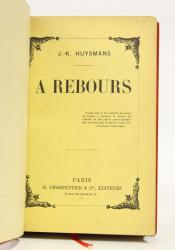Joris-Karl Huysmans' (1848-1907) novel À Rebours is published.
In English, the title translates to Against Nature or Against the Grain. It is considered the embodiment of decadence, often associated with the Decadent Movement. It focuses on sensory experiences. There is one character in the novel, a hero named Jean Des Esseintes––a late nineteenth-century, aristocratic writer. He considers the modern, aristocratic world he lives in as anti-creativity and pro-productivity; therefore, rejects modernity to lead a life devoted to beauty. The significance of him being the only character is related to the Decadent Movement’s positive opinion of social isolation, which allows for psychological alienation. As for Oscar Wilde (1854-1900), it is noted to have inspired The Picture of Dorian Gray (1890) and to be the "poisonous French novel" Dorian Gray is given by Lord Henry. Wilde admired the text and inspired other British Aesthetes and Decadents.
Doyle, Natalie. “Against Modernity: the Decadent Voyage in Huysmans' A Rebours.” Romance Studies, vol. 11, no. 1, 1993, pp. 15–24., doi:10.1179/ros.1992.11.1.15.
Porter, Laurence M. “Huysmans' ‘A Rebours’: The Psychodynamics of Regression.” American Imago, vol. 44, no. 1, 1987, pp. 51–65. JSTOR, www.jstor.org/stable/26304095.

